Electric bikes have revolutionized the way we commute, providing a greener and more convenient mode of transportation. However, one question that often arises among potential e-bike owners is – how long does it take to charge an electric bike?
In this blog post, we’ll dive into factors that influence charging time such as battery types, capacity, charger power output, and environmental factors.
We’ll also provide practical tips to optimize and speed up the charging process for your electric bike.
Key Takeaways
- The time it takes to charge an electric bike battery varies depending on several factors such as its capacity, charger type, and power output. Typically, charging times range from 2 to 6 hours.
- Choosing the right charger and battery capacity for your ebike is crucial in optimizing charging time and ensuring maximum efficiency over the long run. Using a fast charger may reduce charging time considerably; however, it’s essential to ensure compatibility with your e-bike manufacturer’s recommendations before purchasing one.
- Maintaining your e-bike battery properly can help optimize performance while maximizing efficiency. Avoiding extreme temperatures both when storing or using the bike is important; checking regularly for corrosion or dirt build-up can also prevent issues that may negatively impact overall performance. Additionally, adjusting pedal assistance levels based on riding conditions and distance can help improve battery life span whilst minimizing energy usage during rides thereby reducing frequency of charging cycles over time.
Understanding Charging An Electric Bike
To understand how long it takes to charge an electric bike, it’s important to know the battery type and capacity, as well as the charger type and power output.
Battery Types And Capacity
There are several types of batteries used in electric bikes, including lead-acid, nickel-cadmium (NiCd), nickel-metal hydride (NiMH), and lithium-ion (Li-ion) batteries. Among these options, Li-ion batteries have become the most popular choice due to their lightweight design, high energy density, and longer lifespan.
Battery capacity plays a crucial role in determining how long it takes to charge an electric bike. Capacity is measured in watt-hours (Wh) and indicates the amount of energy the battery can store.
For example, a 400 Wh battery can deliver 400 watts of power for one hour or 200 watts for two hours before depleting fully. Most e-bike batteries have capacities ranging from 300 Wh to over 600 Wh, with higher capacities generally providing more extended riding distance on a single charge.
Keep in mind that larger-capacity batteries will require longer charging times.
Charger Types And Power Output
There are various types of chargers available for electric bikes, and each has different power output levels. The most common charger type is a standard 2-amp charger that can take up to 6 hours to fully charge an e-bike battery with a capacity between 400-500 watt-hours.
It’s important to note that not all electric bike batteries are compatible with every charger type or power output level. Therefore, it’s crucial to check both the bike manufacturer’s recommendations and the battery voltage before purchasing a new charger or attempting to use one that isn’t included with your bike.
Charging Time For Different Batteries
The charging time for an electric bike battery can vary depending on its capacity. A battery with a capacity of 400-500 watt hours typically requires about 2-6 hours to charge fully.
However, larger batteries may take longer, and smaller ones may take less time. For example, a battery with a capacity of 200-300 watt-hours may only require 1-3 hours to charge fully.
It’s important to note that the charging time can also be influenced by other factors such as the charger type and power output, the age and temperature of the battery, as well as the motor power of your e-bike.
Factors Affecting Charging Time
Factors that can affect the charging time of electric bike batteries include the battery’s current level, charger power output, temperature, and age of the battery.
Battery Level And Charger Power Output
The charging time for an electric bike battery can depend on the battery’s level and the charger’s power output. If the battery is almost empty, it will take longer to charge compared to a partially charged or fully charged battery.
Also, if you’re using a low-powered charger, your battery may take longer to charge.
For instance, a 250 watt-hour battery connected with a 50-watt charger will require five hours of charging time whereas if you use a 100-watt charger instead of 50 watts, then it would only need around three hours – half of the original time.
Temperature And Age Of The Battery
The temperature and age of an e-bike battery can have a significant impact on its charging time. Generally, batteries charge better in moderate temperatures that range between 50 to 77 degrees Fahrenheit.
High or low temperatures can slow down the charging process or even damage the battery permanently. Additionally, as batteries age, their capacity gradually decreases, which may increase their charging time.
To optimize the life of your battery, it’s vital that you don’t leave it sitting fully charged for too long or let it run down completely before recharging. It is best practice to keep your battery at around half charged when not riding for extended periods; this will help maintain optimal capacity and ensure faster charge times when you’re ready to ride again.
Typical Charging Times And Tips For Faster Charging
Charging an electric bike can take anywhere from 2-6 hours, but there are ways to speed up the process and optimize your battery for maximum efficiency.
Realistic Timeframes For Charging Electric Bikes
On average, it takes between 2 to 6 hours to charge an e-bike battery fully. The charging time can vary based on the battery’s capacity and charger type. For instance, a 400-500 watt hour battery may take around 4-6 hours on its own, whereas a fast charger can reduce this timeframe by up to half.
Therefore when choosing the right charger for your electric bike, it’s essential to consider what you need from your ebike as well as how much time you have available for charging.
Ways To Speed Up Charging And Optimize Battery Life
To speed up charging an electric bike battery, you can invest in a fast charger that delivers high wattage output and gets the job done quickly. Additionally, you can optimize your battery life by avoiding extreme temperatures and fully discharging the battery before recharging it.
Another way to extend the lifespan of your electric bike battery is to avoid using maximum pedal assistance levels constantly. The more power assistance you use when riding, the faster your e-bike’s battery will drain, which means more frequent charging.
By following these tips and making informed choices about how you ride and charge your e-bike’s battery, you’ll maximize its efficiency while keeping downtime minimal.
Planning Your Charging Strategy
Assess your typical usage and needs to determine the appropriate battery capacity and charger type for your electric bike, while also considering ways to optimize battery life and ensure efficient charging.
Assessing Your Usage And Needs
To determine the right charging strategy for your electric bike, it’s important to assess your usage and needs. Consider how often you use your e-bike and for what purposes.
Think about the distance you typically ride, as this can also affect battery life. If you frequently take longer rides, a higher-capacity battery may be necessary.
It’s also crucial to choose the right charger based on your bike’s specifications and manufacturer recommendations. A charger with high wattage output may reduce charging time but could potentially damage the battery if not compatible.
Choosing The Right Charger And Battery Capacity
Selecting the right charger and battery capacity for your electric bike is crucial in optimizing charging time and ensuring that you get maximum efficiency from your battery.
When choosing a charger, it’s important to ensure that it matches the voltage of your battery as well as its amperage output.
Moreover, when selecting a battery capacity, consider factors such as riding distance, pedal assistance levels, motor power, and terrain type. It’s worth noting that a larger-capacity battery requires more charging time but provides longer riding distances.
Maintaining Your Battery For Maximum Efficiency
To get the best performance and longevity out of your e-bike battery, it’s important to properly maintain it. One key factor is ensuring that you don’t overcharge or undercharge the battery, as this can reduce its lifespan.
Regularly checking and cleaning the terminals and connections on your battery can prevent issues caused by corrosion or build-up of dirt and debris. Additionally, keeping an eye on your bike’s usage patterns and adjusting settings like pedal assistance levels can help ensure that you’re not putting unnecessary stress on the battery, which can impact both charging time and overall performance.
Conclusion
Charging an electric bike battery requires understanding the type of battery and charger, power output, and charging time. The factors that affect how long it takes to charge include the battery level, temperature, and age.
On average, it can take around 2-6 hours to fully charge an e-bike battery. However, this is dependent on several factors such as motor power, pedal assistance, and riding distance.
FAQs:
1. How long does it take to fully charge an electric bike battery?
The charging time of an electric bike battery depends on various factors like the model, age and size of the battery, but generally takes around 3-6 hours for a full charge.
2. Can I overcharge my electric bike battery?
It is important not to overcharge your electric bike’s battery as it can cause damage to both the charger and the battery itself. Most chargers come with indicator lights that show when the battery reaches a full charge, so be sure to unplug your charger once this light appears.
3. How frequently do I need to charge my e-bike’s batteries?
You should aim to recharge your e-bike batteries after every use or at least once per week even if you haven’t used them much because lithium-ion batteries tend to lose their efficiency when they stay unused for extended periods.
4. Is it better to partially charge or fully discharge my e-bike’s battery before recharging it?
Lithium-ion batteries used in modern-day e-bikes do not have memory effect issues associated mostly with previous Nickel Cadmium (NiCd) and Nickel Metal Hydride (NiMH) types of rechargeable batterie, making partial charging ideal instead of waiting until it is completely discharged before recharging as this will help prolong its lifespan significantly while keeping it always ready for your next ride.







